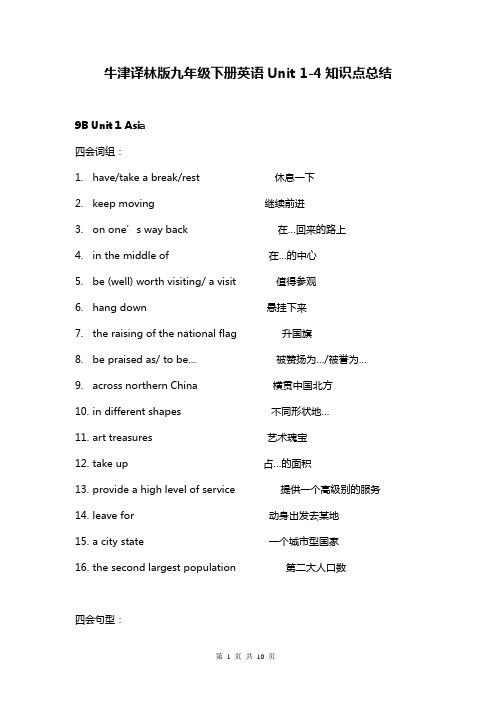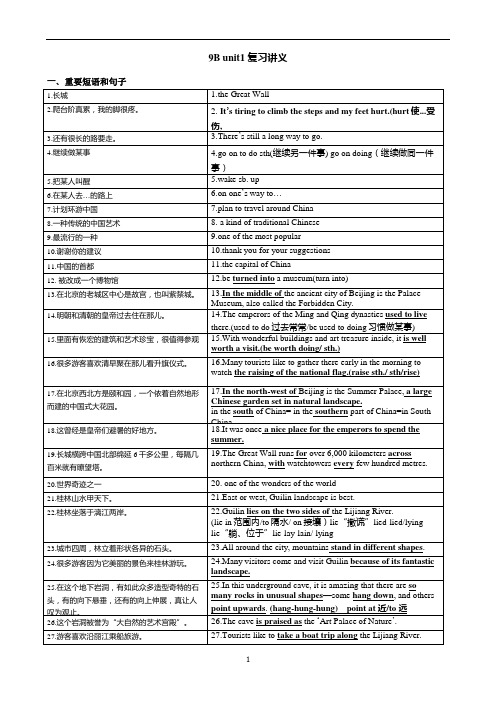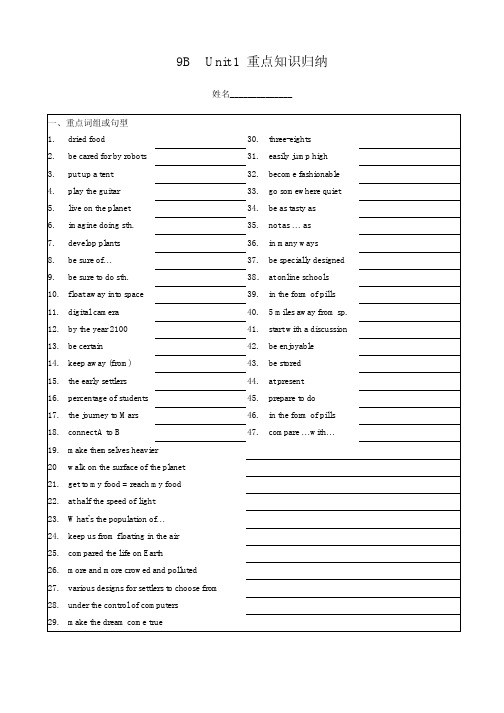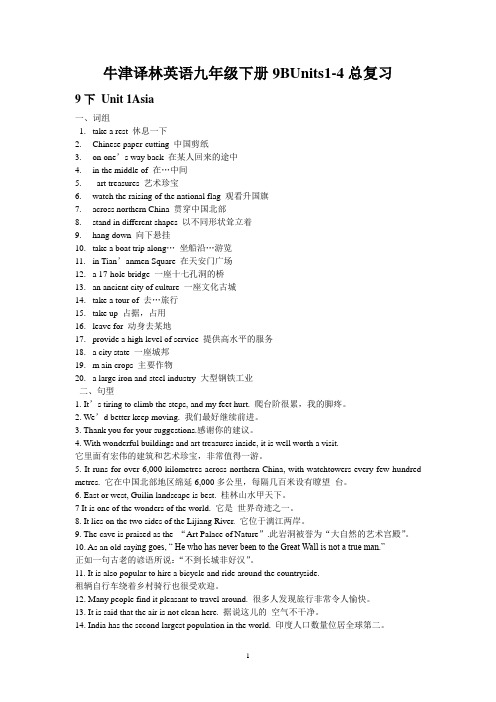牛津译林九年级下册9BUnit1知识梳理
9B Unit 1 知识点归纳

9B Unit 1Welcome解词:1.tiring:tiring: adj。
“使人疲劳的,累人的",常用来形容事或物tired:adj. “感到疲倦的,累人的”,常修饰人。
这两者词根都是tire: “使疲倦;厌烦”例句:Travelling is interesting but tiring. 旅行有趣,但是令人疲倦.It’s tiring to sweep all the rooms by myself. 要我独自打扫所有的房间很累。
类似单词:(exciting, excited ;interesting, interested ;pleasing,pleased ;surprising,surprised)例题:It’s _______ (tire)to climb to the top of the mountain.2.chopsticks: n。
[复] 筷子一双筷子:a pair of chopsticks例句:Mum brought new chopsticks for you. 妈妈给你买来了新筷子。
类似短语:一副眼镜:a pair of glasses一双鞋:a pair of shoes例题:He used a knife instead of chopsticks. __________________________重点句子分析:1.Wow,the Great Wall is amazing, isn’t it?长城真壮观啊,不是吗?反意疑问句构成:两部分,前一部分是一个陈述句,后一部分是一个简短的疑问句,这两部分人称时态应该保持一致原则:前肯后否,前否后肯注意:(1)当陈述部分有hardly, seldom, few,little, no, never,nothing, nobody,nowhere 等具有否定意义的词,反意疑问句要用肯定形式.例句:They hardly went to the movies, did they?他们几乎不去看电影,是不是?He has few friends in the city,does he? 他在这个城市几乎没有朋友,是吗?(2)以Let’s 开头的祈使句,附加问句用shall we;Let us/ me…………………………。
牛津译林英语九年级下册9BUnits1-4词组、句型、语法复习提纲

牛津译林英语九年级下册9BUnits1-4词组、句型、语法复习提纲9A Unit 1词组、句型及语法复习提纲一、词组或短语序号Chinese English1 有许多吃的和喝的(东西) have lots to eat and drink有许多值得庆祝的(事情)have a lot to celebrate2 为……担心worry about …= be worried about…某事使某人担心sth. worry sb.3 △(某人)对(……事物)很熟悉(sb.)be familiar with (sth.) (记住with后跟物)△……对(某人而言)很熟悉….be familiar to (sb.) (记住to后面跟人)4 △西方的文化Western culture(只要了解)5 对……有信心be confident of …. = have confidence in….6 学生会students’union7 被划分为12个星座be divided into 12 star signs8 有时at times = sometimes = from time to time9 一个勤奋的人 a hard-working person10 共同享有相似的特征share similar characteristics11 担心太多worry too much12 注意……pay attention to…13 (关于某事)与某人争吵 argue with sb. (about/over sth.)14 有许多精力have lots of energy15 保守秘密keep secrets16 因为某事而宽恕某人forgive sb. for sth.17 (富)有幽默感 have a (good) sense of humour18 到不同的地方去旅行travel to different places19 关心……care about …20 轻易放弃give up easily放弃某事(代词放中间) give sth. up放弃做某事give up doing sth.21 与某人交朋友/与某人做朋友make friends with sb./ be friends with sb.22 讲笑话tell jokes23 各种各样的……all kinds of…24 向某人解释某事explain sth. to sb.25 炫耀;卖弄show off26 梦到;梦见dream about ….梦到;梦见;梦想;渴望dream of…27 舞蹈课dancing lessons28 seem用法seem + adj. (系表结构)seem to do sth.It seems that + 宾语从句29 尽可能多的信息as much information as possible30 做某事遇到了难题/麻烦have problems/trouble/difficulty with sthhave problems/trouble/difficulty (in) doing sth.31 在学习或工作中取得成功have success at school or work32 最后finally = at last = in the end33 适合于……. be suitable for …..34 ★让某事被别人做(请别人做某事) have sth. done35开心地做某事have (lots of) fun (in) doing sth=have a good time (in) doing sth.= enjoy oneself (in) doing sth.36 提出;想到;拿出(新的主意) come up with (new ideas)37 A和B相似 A be similar to B38 推荐某人担….职务recommend sb. as +职务推荐某人获….奖recommend sb. for+奖项39 暑假作业summer homework40 得到满分get full marks41 给某人作演讲make/give a speech to sb.42 变得更加有条理/效率get more organized43 个人的才能(品质)personal qualities44 同意某人的意见agree with sb./what sb. said45 反对/介意(某人)做某事mind (one’s) doing sth. = mind ( sb.) doing sth.46 接受这份工作take this job47 记得做某事(还没做)remember to do sth.=don’t forget to do sth.记得做过某事(已做过)remember doing sth.48 暑假的剩余部分the rest of the summer holiday49 对某物感到好奇be curious about sth.50. 得病get sick51 大约在这个月中旬around the middle of the month二、重点句子及句型: 1.It’s nice of you to bring me the newspaper, Hobo.2.It says I’ll have lots to eat and drink today.3.You shouldn’t worry about not having breakfast then.4.A year is divided into 12 different star signs.5.Some people believe that people (born under the same star signs) share similar characteristics.6.You are patient and do not give up easily.7.You worry too much at times.8.You are practical and always pay attention to details.9.You love peace and do not like to argue with others.10.It is silly of you not to forgive others for their mistakes.lie finds maths [very difficult].12.You are patient enough to wait for a long time without getting angry.13.You like to dream about everything.14.Mr Wu spends a lot of time explaining things to us.15.This month, you will have a lot to celebrate.16. More details are available on request, please call Master Zhang on 55560678 if you want to know more.17.I may have problems with my health.★18.Peter has had his bicycle repaired.lie will have fun in cooking.20.He is imaginative enough to come up with new ideas.21.I’d like to recommend David as the new chairperson of the Students’ Union.22.We think that David has all the qualities (to be a good chairperson).三、语法:1. It is + adj. + of sb. +(not )to do sth. eg. It is kind/friendly/silly of you to do so. (此种句型中的形容词是指of 后的人所具备的性格特征或品行,如:friendly, kind, silly clever,careful , careless, selfish, generous , foolish等。
牛津译林版九年级下册英语Unit 1-4知识点总结

牛津译林版九年级下册英语Unit 1-4知识点总结9B Unit 1 Asia四会词组:1.have/take a break/rest 休息一下2.keep moving 继续前进3.on one’s way back 在…回来的路上4.in the middle of 在…的中心5.be (well) worth visiting/ a visit 值得参观6.hang down 悬挂下来7.the raising of the national flag 升国旗8.be praised as/ to be…被赞扬为…/被誉为…9.across northern China 横贯中国北方10.in different shapes 不同形状地…11.art treasures 艺术瑰宝12.take up 占…的面积13.provide a high level of service 提供一个高级别的服务14.leave for 动身出发去某地15.a city state 一个城市型国家16.the second largest population 第二大人口数四会句型:1.It’s tiring to climb the steps, and my feet hurt.爬台阶很累人,我的脚疼。
2.We had better keep moving.我们最好继续前进。
3.Thank you for your advice/ suggestion.谢谢你的建议。
4.With wonderful buildings and art treasures inside, it is well worth avisit.它里面有宏伟的建筑和艺术珍宝,非常值得一游。
5.It runs for over 6000 kilometres across northern China, with watchtowers every few hundred metres.6.它(长城)在中国北部地区绵延6000多公里,每隔几百米设有瞭望塔。
牛津译林版九年级英语下册9B Unit1重要句子、短语、语法复习

9B unit1 复习讲义28.租自行车、骑车环城游也很流行。
28.It is also popular to hire a bicycle and ride around thecountryside.29.这作为博物馆对外开放。
29.It is open to the public as a museum.30.正如一句谚语,“不到长城非好汉”。
30.As an old saying goes, ‘He who has never been to the GreatWall is not a true man.’31.占据(时间/空间) 31. take up32.占据面积的四分之三32.take up three quarters of the area33.一个17孔桥33. a 17-hole bridge34.在桥的两边都有很多石狮子。
34.There are many stone lions on either side of it.=on bothsides of35.离开A去B 35.leave A for B36.据说/据报道/证明36.It’s said/ reported/proved that …37.提供高的服务水平37.provide a high level of service (in service 服务,投入使用)38.看主要风景38. see the main sights39.滑雪39.go skiing40.游览…40.take a tour of…41.日本最高的山41.Ja pan’s highest mountain42.尝试各种食物42.try all kinds of food43.乘长途客车去…43.take a coach to…/ go to … by coach44. 在东南亚44. in South East Asia45.说英语和汉语45. speak both English and Chinese46.日本是我们在亚洲要参观的第二个国家。
【原创】江苏译林版9B Unit 1 重点知识归纳

9B Unit 1 重点知识归纳姓名______________一、重点词组或句型1. dried food 30. three-eights2. be cared for by robots 31. easily jump high3. put up a tent 32. become fashionable4. play the guitar 33. go somewhere quiet5. live on the planet 34. be as tasty as6. imagine doing sth. 35. not as … as7. develop plants 36. in many ways8. be sure of…37. be specially designed9. be sure to do sth. 38.at online schools10. float away into space 39. in the form of pills11. digital camera 40. 5 miles away from sp.12. by the year 2100 41. start with a discussion13. be certain 42. be enjoyable14. keep away (from) 43. be stored15. the early settlers 44. at present16. percentage of students 45. prepare to do17. the journey to Mars 46. in the form of pills18. connect A to B 47. compare …with…19. make themselves heavier20 walk on the surface of the planet21. get to my food = reach my food22. at half the speed of light23. What’s the population of…24. keep us from floating in the air25. compared the life on Earth26. more and more crowed and polluted27. various designs for settlers to choose from28. under the control of computers29. make the dream come true二、重点、难点1. How do you like …?= How do you find …? = What do you think of …?【例】How do you like your teacher, Mr. Li? (改为同义句)(1) What do you your teacher, Mr. Li?(2) How do you f your teacher, Mr. Li?2. get to(1) 吃到、够到eg. The little child too short to get to the food on the table.(2) 到达eg. When we got to the airport, the plane had taken off.【比较】get to + 地方(注意:当get to 后接here, there, home 等副词时,必须去掉to)arrive in + 大地方arrive at + 小地方reach + 地方eg. I will call you as soon as I get to / arrive in / reach Beijing.3. can 与be able tocan 用于一般现在时和一般过去式(could) 强调人们有做某事的能力be able to 现在时、过去时、将来时、完成时都可用强调通过努力而做某事eg. My son can swim now but he couldn’t last year.Though the fire spread through the hotel very quickly, everyone was able to get out. (表示通过努力)4. care for (1) = take care of = look after(2) = care about eg. He spent his life caring for the poor.5. form (1) n. 形状、形式eg. Swimming is a good form of exercise.(2) n. 表格eg. Please fill in the form first.(3) v. 组成、形成eg. We are going to form a class for beginners in English.6. play the guitarplay footballplay chess / cardshave breakfast / lunch / supperby car / bus / planeNew Year’s Day / Women’s Dayspeak Chinese / teach English7. put 常考词组put away 把…收拾(干净)put out 扑灭(火)put off 推迟put down 放下、记下put up 举起、建造、竖起put on 穿上put back 放回8. imagine ( n. imagination想象力、幻觉adj. imaginative 有想象力的)(1) vi “设想、想象”eg. You will like the film, I imagine.(2) vt “想象、设想、猜想”+ 名词、动名词、从句等eg. Try to imagine being on the moon.9. by the year 2100(1) by +将来的时间,常用将来时eg. Daniel is thinking about what life will be like by the year 2050.(2) by +过去的时间,常用过去完成时eg. By the end of last year, it had produced over 2000 computers.10. more and more beautiful“比较级+ 比较级” stronger and stronger11. crowded 拥挤的、挤满了人的crowd 群、人群eg. There were crowds of people at the theatre.eg. There was a crowd of 20,000 people at the football match.12. polluted 受到污染的pollute 污染eg. All those waste products are polluting the river.pollution [U] air ~, noise ~eg. There is a lot of pollution in the air here.13. hopefully hopeful hopelesshope to do eg. They waited wand waited because they hoped to see their favourite film stars.hope that eg. My father hopes that I can be a host in the future.wish to do eg. I wish to come tomorrow.wish sb to do eg. My parents wish me to become a policeman when I grow up.14. too…to…常与so…that…, not…enough to…的句型转换【重点:so that结构参考8B Unit 5, 9A Unit 2】eg. The water is too dirty to drink. = The water is so dirty that we can’t drink it.= The water is not clean enough to drink.15. at present 常用于现在进行时eg. My cousin is making kites at present.16. spacecraft 单复数同形 a manned spacecraft17. spend take pay cost afford 【重点:请参考8B Unit 2, 9A Unit 1】18. at the speed of at high /great speed at full / top speedeg. The car is driving at the speed of 150 kilometres an hour.19. humanhuman being 人类human nature 人性human right 人权【注意几个单词的复数】humans, Germans, walkmanspostmen, policemen, Englishman等20. develop development developed(发达的)developing (发展中的)21. three-eighths 分数的表示法:分子用基数词;分母用序数词(1) 分子大于1时,分母要加-s; one fourth three fourths(2) 分子和分母之间可用连字符,也可不用one-third【注意:分数作主语时】当分数作主语时,谓语动词的形式取决于与分数相关的名词或代词的数:(1) 如果主语是单数或不可数名词,谓语动词用单数形式eg. Three fourths of the surface is covered with water on Earth.(2) 如果主语是可数名词的复数,谓语动词用复数形式eg. About one-fifth of the students in our class are from the countryside.22. 代词it, that, one的区别it 特指上文提到的“同个、同物”I can’t find my pen. Where is it?that 特指上文提到的“同一类”,但不是同一个;常用于单数可数名词和不可数名词The weather in Moscow is colder than that in Beijing.one 泛指上文提到的名词所表示的人或事物的任一个I can’t find my pen. I have to buy one.23. prevent sb ( from ) doing = stop sb ( from ) doing = keep sb from doing【注意】在用于被动语态中,from不能省略He was stopped from driving because he was drunk last night.24. compare… with…. 把…与…进行比较eg. If you compare British football with American football, you will find many differences.compare…to…把…比作eg. Children are often compared to flowers.25. in many ways 在许多方面in different ways 以不同的方式in the same way 以同样的方式in some ways 在某些方面,在某种程度上in the way 挡道、妨碍on the way…在路上、在途中by the way 顺便问一下26. connect…to…把…和…连接起来eg. Did you connect the keyboard to the computer properly?27. as + 形容词/ 副词的原形+ asnot so /as + 形容词/ 副词的原形+ as “不如”eg. Jack doesn’t run as fast as Tom.= Tom runs faster than Jack.28. space (1) 太空[U],前面一般不用冠词eg. On June 16th, 2012, Liu Yang became the first woman to go into space in China.(2) 空间[U] = roomeg. Excuse me, can you make some space for me?29. population 人口(1) [U] eg. What is the population of China? Shanghai has a population of 20,800,000 at present.(2) 人口的“多和少”时,只能用large或small 【参考price的用法】The population of China is much larger than that of Japan.30. enjoyable enjoy ( oneself / doing sth )31. provide sb. with sth = provide sth for sb 【注意常用于被动语态】eg. They provide the poor people with food and clothes.offer sb sth = offer sth to sb. eg. He offered the people his great help.32. fix up = repair eg. He is fixing up his bike.fix…on eg. He fixed the machine on the ground.33. advantage [C U] disadvantage [C U] 用作可数名词的时候较多eg. Living in the big city has many advantages, such as good schools, libraries, hospitals and theatres.34. start with… = begin with …35. harm [U] harmful harmless(1) harm [U] eg. There is no harm in trying.(2) do harm to eg. Such books do great harm to young people.(3) be harmful to eg. Watching too much TV is harmful to your eyesight.36. have sb. do sth. 让某人做某事eg. Why not have your brother take a message for us?have sth. done (常指请人把)某事被做eg. Next Sunday, I will have my computer repaired.have sth. to do 有某事要做eg. I have something important to say.37. feel like doing 想做某事would like to do38. go somewhere quietgo somewhere quietly39. specially “专门、特地”eg. The red dress is specially designed for Zhang Ziyi.especially “尤其、特别地”eg. Stay away from junk food, please. It’s bad for us, especially for children.40. can 和could(1) 表示能力“能、会”( could是过去式) eg. I can speak Japanese.(2) 表示请求“可以”( could比can更客气) eg. Can / Could I use this dictionary? Yes, You can.(3) 表示推测“一定不”( could是过去式) eg. This pen can’t be Li Ming’s.41. may 和might(1) 表示“允许”( might是过去式) eg. You may sit down now.(2) 表示“请求”( might 比may更委婉) eg. May / Might I try again? Yes, you may. / No, you may not.42. 表示请求时(1) can 非正式用语,口语,请求的对象一般是同学或朋友(2) could 比can 更委婉,常用于老师或成人之间(3) may 既正式又礼貌,用于陌生人或尊敬的人之间(4) might 非常正式,较少用43. 宾语从句(一)(宾语从句与直接引语改为间接引语有很多相同之处)掌握好宾语从句的内容,主要是从连词、语序和时态3个方面着手。
牛津译林英语九年级下册9BUnits1-4总复习

牛津译林英语九年级下册9BUnits1-4总复习9下Unit 1Asia一、词组1. take a rest 休息一下2. Chinese paper-cutting 中国剪纸3. on one’s way back 在某人回来的途中4. in the middle of 在…中间5. art treasures 艺术珍宝6. watch the raising of the national flag 观看升国旗7. across northern China 贯穿中国北部8. stand in different shapes 以不同形状耸立着9. hang down 向下悬挂10. take a boat trip along…坐船沿…游览11. in Tian’anmen Square 在天安门广场12. a 17-hole bridge 一座十七孔洞的桥13. an ancient city of culture 一座文化古城14. take a tour of 去…旅行15. take up 占据,占用16. leave for 动身去某地17. provide a high level of service 提供高水平的服务18. a city state 一座城邦19. m ain crops 主要作物20. a large iron and steel industry 大型钢铁工业二、句型1. It’s tiring to climb the steps, and my feet hurt. 爬台阶很累,我的脚疼。
2. We’d better keep moving. 我们最好继续前进。
3. Thank you for your suggestions.感谢你的建议。
4. With wonderful buildings and art treasures inside, it is well worth a visit.它里面有宏伟的建筑和艺术珍宝,非常值得一游。
译林牛津版九年级下册9B-Unit-1-Asia-知识点讲解课件

I wonder if you could let me stay for a few days.
lie的含义及用法: vi. 躺,平卧(lay,lain) 比较: lay v.放置 laid;laid
4. The boy __l_a_y__ in the sofa just now. 5. Mary enjoyed the full moon, __ly__in_g_ on the ground.
6. He __l_ie__d_ about his experience.
(1) At the foot of the mountain __B______.
走30分钟的路对于我来说很累人。
It was a __t_ir_i_n_g__day and she felt very _t_ir_e_d___.
那是疲劳的一天,她感到很累。 拓展
amazing/amazed; exciting/excited
boring/bored; interesting/interested
rise vi. (rose, risen) 后面不加宾语 (1)意为“上升,升高,上涨”。
城市人口已增加到五百万。
The population of the city has risen to five million. (2)rise还表示“起立;起床”。
他站起了身走出屋去。
He rose and left the room. The sun _r_is_e_s___ in the east. The sun has not ____r_i_s_e_n____ yet.
牛津版九年级英语下册9B Unit 1 知识讲解和练习

9B U1 知识讲解要点剖析1.Wow, the Great Wall is amazing, isn’t it? 哇,长城太神奇了,不是吗?①amaze是动词,意为“使惊奇”Your patience amazes me. 你的毅力使我惊讶。
②amazed为过去分词,用作形容词,意为“感到惊奇的”,修饰人。
I was amazed to meet him there. 我很惊讶在那见到他。
③该句为反意疑问句:前否很肯,前肯后否。
They hardly have any spare time for hobbies, do they?2. Although there’s still a long way to go, we’d better continue to the end. 虽然仍有很长的路要走,但是我们最好坚持到最后。
① although是连词,意为“虽然,尽管”,用法比较正式,多用于句首,用来引导让步状语从句,可以与though互换。
Although/Thoug h he is in poor health, he works hard.② to go是动词不定式做后置定语修饰前面的a long way.The library is a good place to study.合作探究1.Unless you have a map, you will get lost easily in it. 如果你没有一张地图,你会很容易迷路的。
Unless是从属连词,意为“如果不,除非”,引导条件状语从句,含有否定意思,相当于if条件状语的否定形式,即unless=if…notWe’ll go to the zoo unless it rains tomorrow.如果明天不下雨,我们将去动物园.2.The emperors of the Ming and Qing dynasties used to live there. 明清两朝的皇帝过去住在哪里。
- 1、下载文档前请自行甄别文档内容的完整性,平台不提供额外的编辑、内容补充、找答案等附加服务。
- 2、"仅部分预览"的文档,不可在线预览部分如存在完整性等问题,可反馈申请退款(可完整预览的文档不适用该条件!)。
- 3、如文档侵犯您的权益,请联系客服反馈,我们会尽快为您处理(人工客服工作时间:9:00-18:30)。
牛津译林九年级下册9BUnit1知识梳理【短语归纳】1.the capital of China 中国首都2.the Palace Museum 故宫ed to do 过去做某事4.be used to do 被用来做5.be used to doing 习惯于做某事6.be worth doing 值得做某事7.early in the morning 清晨8.every few hundred metres 每隔几百米9.one of the wonders of the world 世界的奇迹之一【重要句型】1.In the middle of the ancient city of Beijing is the Palace Museum, also called the Forbidden City. 在北京古城的中部是故宫博物院,也叫紫禁城。
middle是名词,意为“中间,中央”。
in the middle of意为“在……中间”,既可用于空间,也可用于时间或活动等。
【辨析】middle,centre例2. A dog is lying in the middle of the road. 一条狗正躺在路中间。
2.The emperors of the Ming and Qing dynasties used to live there. 明朝和清朝的皇帝们过去居住在那里。
used to do sth.意为“过去常常做某事”,通常指过去的习惯动作。
例:My grandparents used to walk after supper. 我的爷爷奶奶过去经常在晚饭后散步。
【辨析】used to do sth.,be used to do sth.,be used to doing sth.例2. Computers can be used to play games. = Computers can be used for playing games. 电脑可以用来玩游戏。
3.With wonderful buildings and art treasures inside, it is well worth a visit. 它里面有令人惊叹的建筑和艺术珍品,很值得参观。
worth是形容词,意为“有……价值,值……钱”,其后可接名词,但在接动词时,应用该动词的-ing形式或该动词不定式的被动形式,即be worth doing sth.或 be worth to be done,意为“……值得做”。
例1.If you answer the question correctly, it’s worth two points. 答对了这道题可以得2分。
例2. The mobile is worth buying/ to be bought. 这部手机值得买。
4.Many tourists like to gather there early in the morning to watch the raising of the national flag. 许多游客喜欢在清晨聚集在那里看升国旗。
(1)句中动词不定式短语 to watch the raising of the national flag 作目的状语。
例:The teacher spoke loudly enough to make the students hear what he said. 老师说话声音足够大,以使学生们听到他的话。
(2)raising是名词,意为“升髙”。
例:He is watching the raising of the balloon. 他正在观看气球的升高。
【拓展】① raise vt. 筹集,招募,相当于collect。
常用结构:raise… for...意为“为……筹集……”。
例:We are raising books and clothes for the students in poor areas. 我们正在为贫困地区的学生筹集书籍和衣物。
I will raise enough money for my holiday. 我将筹够钱去度假。
② raise vt. & vi. 举起,抬起,提高;养育,种植。
例:If you have any question, raise your hand, please. 如果你有问题,请举手。
Do you know how people in the south raise rice? 你知道南方人如何种植水稻吗?【辨析】raise,rise例2. Anne raised her voice in order to be heard.5.Another famous attraction is the Great Wall. 另一个著名景点是长城。
attraction是名词,意为“吸引,吸引力,吸引人的事物”。
【拓展】(1)attract v. 吸引(某人的注意力、兴趣、情感等),引起(兴趣、关注等),使喜爱,后面的宾语可以是人,也可以是物;如果与介词to连用,则表示“把……吸引到……”。
(2)attractive adj. 有吸引力的,吸引人的,有魅力的,引人注目的。
例:She is a very attractive lady. 她是一位非常有魅力的女士。
例1. My favourite attraction is Lijiang River. 我最喜欢的名胜是漓江。
例2. The teacher attracts his students because of his excellent teaching. 这位老师吸引他的学生是因为他出色的教学。
例3. She is a very attractive lady. 她是一位非常有魅力的女士。
6.It runs for over 6,000 kilometres across northern China, with watchtowers every few hundred metres.across表示横穿;穿过,着重指从物体表面的一边到另一边,也就是说从物体的表面穿过;through意为穿过,指从空间的一头纵穿到另一头,也就是说从物体的内部空间穿过、穿越;over一般指在……的上方(与该物体没有接触)。
例1. He watched Karl run across the street to Tommy.例2. There is a bridge over the river.7.It lies on the two sides of Lijiang River. 它位于漓江的两岸。
lie是动词,意为“位于”,相当于be或stand,其过去式是lay,过去分词是lain。
例:Japan lies to the east of China. 日本位于中国东面。
【拓展】(1)lie vi. 认躺,平卧,其现在分词形式是 lying,过去式是lay,过去分词是lain。
常用结构:lie on... 意为“躺在……上面”。
例:He often lies on bed to read. 他经常躺在床上看书。
(2)lie vt. & vi. 说谎,撒说,其过去式和过去分词都是lied;lie作名词,意为“谎言,谎话”,tell a lie 意为“说谎”。
例:Lies can’t cover the facts. 谎言掩盖不了事实。
(3)lay vt. 放;产(卵),下(蛋)。
例:The hen lays an egg every day. 这只母鸡每天产一只蛋。
例1. The factory lies to the west of town.例2. The hen laid three eggs.例3. She lied to them, about her age in order to get the job.8.…some hang down, and others point upwards. ……,有的向下悬垂,还有一些向上伸展。
(1)hang是动词,意为“垂下,悬挂”。
例:My mother hung the washing on the line to dry. 我的母亲把洗好的衣服挂在绳子上晾干。
【拓展】hang vt. & vi. 上吊,绞死。
例:He hanged himself two hours after arriving at a mental hospital. 他到达精神病院两小时后上吊自杀了。
(2)point是不及物动词,意为“指,指向”。
例:I asked him where the post office was and he pointed across the street. 我问他邮局在哪里,他指向大街的对面。
【固定搭配】point at 指着(近处)point to 指向(远处) point out 指出,指明【拓展】point n. 点,小数点,要点,尖端,(体育比赛中的)得分,是可数名词;pointed adj.尖的,尖锐的,明确的;pointedly adv. 尖锐地,明确地。
例:Our team scored six points in the game. 在比赛中我们队获得了 6分。
He said, pointedly, your idea was not right. 他尖锐地说出你的想法是不对的。
例1.It’s rude to point at others with your fingers.9.I hope you can visit my city one day! 我希望有一天你能参观我的城市!句中one day意为“有一天,有朝一日”,指将来的某一天。
one day也可以用来表示过去的“某一天”,一般用于讲故事或叙述过去的事情,且放在句子开头。
例:You will understand what I said one day. 总有一天你会明白我所说的话的。
One day, a boy got lost on his way home. 有一天,一个男孩在回家的路上迷路了。
例1. I hope I can pass the exam.10.Guilin is famous for its beautiful landscape. 桂林以其美丽的景色而著称。
be famous for意为“因/以……而著名”,相当于 be well-known for。
